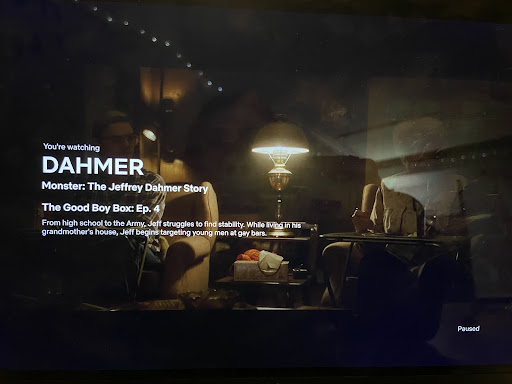DISCLAIMER: This article includes spoilers.
The release of Netflix’s “Monster: The Jeffrey Dahmer Story” on Sept. 21 has created polarizing opinions all around. People are praising the show’s direction, story, script, and acting, while many others are upset over the fact that the victims’ – who were mostly black – families were never told about the production and are now being forced to relive their trauma through highly graphic depictions of the murders.
The show is an intriguing watch for those who are fans of true crime, and those who just like good television. The plot keeps the audience interested, the soundtrack is impeccable, the cinematography is pleasing, and the set design captures the essence of the decades in which the show takes place. Angela Tierney ’25 watched it in one day.
“Evan Peters did a really good job of depicting Dahmer as a sadistic human being, and the general production was fantastic,” Tierney said. “It was hard to watch at some parts, though, because they went into so much detail about what Dahmer did to his victims and I know a lot of people who were not able to finish the series because of how graphic it was.”
The show does not sugarcoat anything. In the very first episode, human remains are found in Dahmer’s apartment. In the seventh episode, his neighbor listens in on what is very clearly the sound of Dahmer murdering someone. It is not a new concept for TV shows to be graphic with violence, but when it involves the stories of real people, it can be a touchy subject.
One of the biggest reasons the show has made so many headlines since its release is that none of the victims’ families were notified about the production and are now being forced to relive the trauma as people around the world rave about it. Although Tierney enjoyed the show, she finds the whole situation troubling.
“I think it is extremely upsetting how the creators did not get consent from any of the victims’ families to make this show,” Tierney said. “I couldn’t imagine living with the trauma of losing a loved one in such a horrifying way, and now seeing everyone talk about the show must make it so much worse. It’s almost like they’re exploiting the victims.”
Another issue that has risen is how people have begun to romanticize and pardon Dahmer and his actions based on how Evan Peters plays him and the way the series shows Dahmer’s upbringing. The series goes in-depth on his childhood and his family life, explaining that he was bullied in school, repeatedly witnessed his parents arguing until their divorce, and was left by himself for three months when he was 17 years old, among other things.
“None of the things Dahmer went through as a child excuse his behavior, and it’s really concerning to see that people are trying to forgive him because he had a rough life,” Maddie Graessle ‘25 said. “A lot of people have hard childhoods [but] it doesn’t mean you get to go around killing people.” She also finds it strange how people are now obsessing over Dahmer because of Peters’ looks.
“We should definitely give Evan Peters the credit for being a good actor and playing him realistically, but it’s disgusting how people are romanticizing Jeffrey Dahmer because of the way Evan Peters looks and how he plays him. He was a horrible man who committed heinous acts,” Graessle said.
Despite all of this, the series is not entirely negative in its content. It does a decent job of showing how the legal system failed Dahmer’s victims for far too long, and it conveys how disturbed of a man he was. When watching, it is important for audiences to think critically about the material they are viewing.
“Monster: The Jeffrey Dahmer Story” is now streaming on Netflix.
Featured Image Courtesy of Catherine Kutson


















































































































